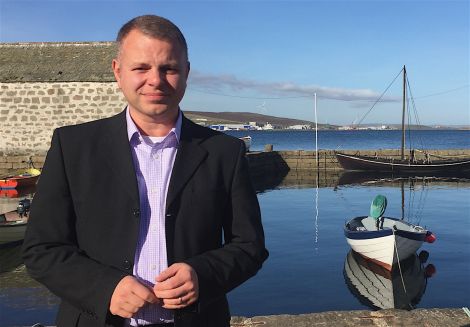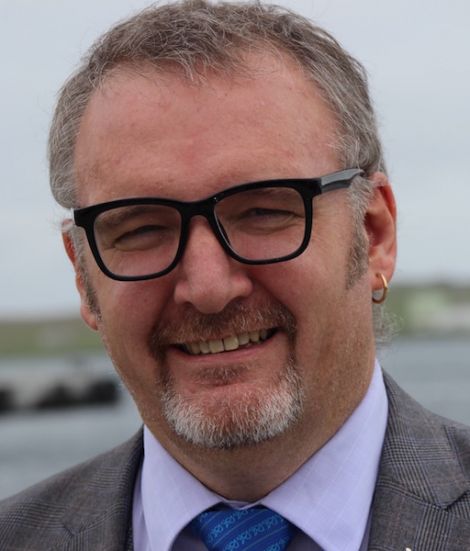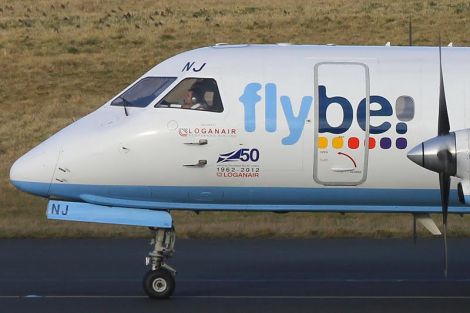News / Hinkles oversees attitude change at Loganair – but phasing out Saab 340s will take years
IT IS likely to be between five and 10 years before Loganair replaces its ageing fleet of Saab 340 aircraft, the company’s managing director has confirmed.
Jonathan Hinkles, who returned to the company this summer following a turbulent phase in the airline’s history, said a “longer term piece of work” was being carried out on replacing the fleet.
Shetland Islands Council leader Gary Robinson, who welcomed Monday’s announcement that Loganair’s franchise arrangement with Flybe will come to an end in August 2017, has again been talking up the Faroese example as one the Scottish airline could follow.
When a local authority delegation visited Faroe they were struck by how, by using aircraft like the Airbus A319 and modern navigational technology, Vagar Airport had “virtually eliminated fog days” having previously been “plagued” by them.
Robinson told Shetland News there were also other regional jet types that operated in and out of London City Airport, which has a similar length to Sumburgh’s 1,500-metre runway, that could be options for Loganair.
“They appear to be streets ahead of what we’ve got here,” he said of the Faroese, adding he believes there is a case for larger, 100+ seater aircraft even if that meant flights becoming less frequent.
“They also have the benefit that they have advanced flight systems that mean they can land, we were told in Faroe, when the cloud level is down to about 150 feet, which is significantly lower than Sumburgh.”
Robinson said being stuck with at least some of the Saab 340s, which have been out of production since the late 1990s, for another 5-10 years was “unacceptable”.
Hinkles said the larger Saab 2000 planes used on some flights to and from Sumburgh already had new navigational aids fitted, while the Saab 340s will be kitted out “to be able to use satellite-based navigation” within two years.
Become a member of Shetland News
He added: “We’re doing a longer term piece of work on fleet replacement and development. The timescale is in the 5-10 year category rather than 0-5. It’s something we recognise we’ll have to do.”
More generally, Robinson welcomed the announcement regarding Flybe, and said he hoped Loganair would be “speaking with stakeholders including the council in fairly short order to spell out what the changes are likely to be and what the impact is likely to be”.
Airline’s change of mindset
There has certainly been a sea change in attitude towards public engagement in recent months. After the company spent much of 2015 ducking questions, refusing interviews and hiding behind a PR firm, since Hinkles returned to the fold there has been a refreshing new approach.
More than happy to field questions on a wide range of topics, Hinkles acknowledges that this time last year – with punctuality having slumped to the point where around one in four flights was delayed by 15 minutes or more and pilots were airing serious safety concerns – legitimate questions were being asked about whether Loganair even had a future.
Fast forward 12 months and the airline has at least partly turned things round, with no flight cancellations at Sumburgh in the whole of October and punctuality up above 90 per cent.
More engineers have been taken on and a spare parts hub based in Glasgow has allowed for speedier maintenance of planes.
“I’m pleased with the progress we’ve made,” says Hinkles, “albeit I’m under no illusion that we’ve still got a lot of progress to continue to make.
“There’s been a fairly big statistical improvement. Our customers feel that and everybody in the organisation feels the benefits of those improvements – so we’ve got to make sure it stays at those levels.”
Concern remains about the high cost of air travel, but a more reliable service – and the impending introduction of new links to Manchester and the Faroe Islands – will go some way towards restoring public faith in Loganair.
End of an uneasy partnership
Parting ways with Flybe, the budget airline which always seemed an awkward fit with the unique requirements of the Highlands and Islands, is unlikely to do any harm either.
When it took over the franchise back in 2008, there was something of a tug of war before Flybe eventually relented and rescinded high debit and credit card charges and agreed to include luggage allowance within airfares.
But changes such as the introduction of a compassionate fare scheme and cheaper child fares were never going to sit easy with Flybe’s business model.
It is hoped locally that going it alone will mean the company can be a bit nicer in the way it treats passengers.
“We think that the move will help us to both develop partnerships with a wider range of airlines, and will also mean we can be more responsive,” Hinkles says.
“Things like the child discounts, those kind of things never sat comfortably within the Flybe franchise structure. In the Highlands and Islands, one size doesn’t fit all.”
But the major sticking point was financial. The franchise agreement was due to expire at the end of August 2017 and, put simply, if Loganair wanted to continue its relationship with Flybe it would have cost more and resulted in fare increases.
“The new arrangement that had been offered contained a very significant increase in the amount we’d be required to pay to operate the Flybe brand,” Hinkles explains. “That would have resulted in fares going up, and we weren’t happy to do that.”
Following Scott Grier’s sale of his majority stake in the company in 2012 to Steven Bond, Loganair has since early 2015 been owned by parent company Airline Investments Ltd, which has also acquired BMI Regional.
Hinkles said that, while the two companies do club together for things like buying insurance and aviation fuel, they remain “very, very separate businesses” and that had no bearing on the decision to end the relationship with Flybe.
A codeshare with British Airways enabling through travel to London will continue, while Loganair says it has “recommended to Flybe that it would be sensible for both of us to retain a working relationship” so passengers can benefit from onward connections to numerous destinations.
It is unclear what will happen to loyalty schemes such as AVIOS. Hinkles says a replacement will have to be found: “We don’t have an answer at this point in time, but we recognise there is a need for it [and we will put] something in place to reward frequent travellers,” he says.
“Most airlines now are members of larger schemes rather than doing their own local scheme – a very clear message that that is both what works and what customers want.”
Shetland News approached Flybe for comment on Tuesday but has yet to receive a response.
Become a member of Shetland News
Shetland News is asking its many readers to consider paying for membership to get additional features and services: -
- Remove non-local ads;
- Bookmark posts to read later;
- Exclusive curated weekly newsletter;
- Hide membership messages;
- Comments open for discussion.
If you appreciate what we do and feel strongly about impartial local journalism, then please become a member of Shetland News by either making a single payment, or setting up a monthly, quarterly or yearly subscription.






























































